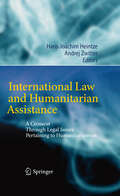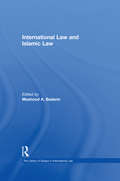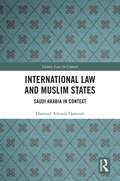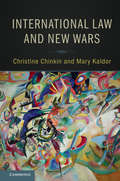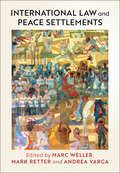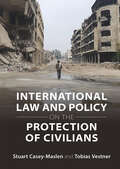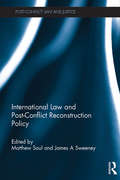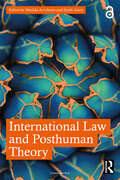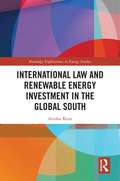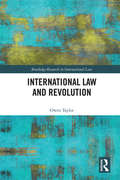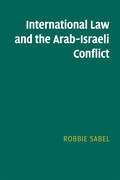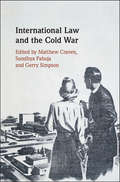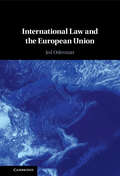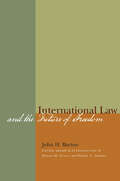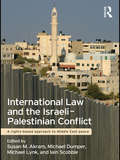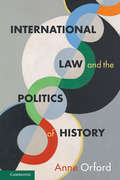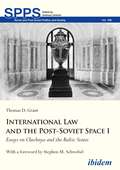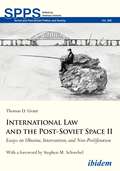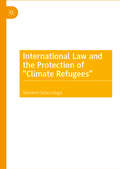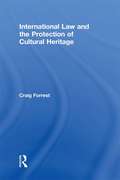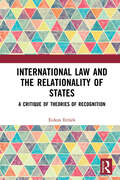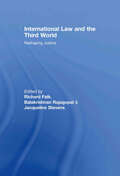- Table View
- List View
International Law and Humanitarian Assistance
by Andrej Zwitter Hans-Joachim HeintzeIt is becoming increasingly apparent that there are major gaps in International Humanitarian Law and Public International Law in the area of humanitarian assistance. In response international organizations such as the UN and the EU are developing their own legal frameworks for humanitarian assistance and the body of customary law and so-called international disaster response law is growing steadily. This however shows that a coherent body of law is far from being a given. The legal reality of international law pertaining to emergency response is rather broadly spread over various international legal fields and related documents, covering situations of armed conflict and natural disasters. This book is one of the first attempts of linking different legal areas in the growing field of what could be called the international law of humanitarian assistance.
International Law and Islamic Law
by MashoodA. BaderinThe relationship between modern international law and Islamic law has raised many theoretical and practical questions that cannot be ignored in the contemporary study and understanding of both international law and Islamic law. The significance and relevance of this relationship in both academic and practical terms, especially after the terrorist attacks of 11 September 2001, is now well understood. Recent international events in particular corroborate the need for a better understanding of the relationship between contemporary international law and Islamic law and how their interaction can be explored and improved to enhance modern international relations and international law. The articles reproduced in this volume examine the issues of General Principles of International Law, International Use of Force, International Humanitarian Law, International Terrorism, International Protection of Diplomats, International Environmental and Water Law, Universality of Human Rights, Women's Rights, Rights of the Child, Rights of Religious Minorities, and State Practice. The essays have been carefully selected to reflect, as much as possible, the different Islamic perspectives on each of these aspects of international law.
International Law and Its Discontents
by Barbara StarkIn Civilization and its Discontents, Sigmund Freud argued that civilization itself is the major source of human unhappiness, inhibiting instincts and generating guilt. In Globalization and its Discontents, Joseph Stiglitz shows how the 'economic architecture' that produced globalization has also driven the backlash against it. This book brings together some of international law's most outspoken 'discontents'; those who situate their malaise in international law itself. Their shared objective is to expose international law's complicity in the ongoing economic and financial global crises and to assess its capacity - and its will - to constructively address them. Some, like Freud, view that which holds us together as an inevitable source of discontent. Others, like Stiglitz, draw on the energy of the backlash. How have these crises affected particular groups, sovereign states, and international law itself? How have they responded? When does crisis serve as a catalyst, and for what?
International Law and Muslim States: Saudi Arabia in Context (Islamic Law in Context)
by Dawood Adesola HamzahThis book analyses the general interaction between international law and Islamic law in the Muslim world today. It interrogates factors that often form the root of the tension between the two legal regimes. Literalist interpretations of Islamic law and the modern international law's disposition that does not give due consideration to differences among cultures and civilizations are some of these factors. This work examines the Saudi Arabia textualist approach to the two primary sources of law in Islam, the Qur’an and Sunnah, and argues that a liberal approach of interpretation has become sine qua non especially now that myriad issues are confronting the Muslim world generally and Saudi Arabia in particular. Similarly, globalization has generated an unprecedented multi-culturalism, legal-pluralism, and trans-border interactions in socio-economic and political relations. Therefore, Saudi Arabia, as the bastion of Islam and Islamic nations, is faced with the imperative of adopting a liberal approach to interpretation of Islamic law, with a view to accommodating a wide spectrum of other laws and cultures. The book provides a timely examination of the issue of modern Saudi Arabia, Islamic legal order vis-à-vis the contemporary concept of international law and international relations in specific areas such as international human rights law and trans-national economic matters. As such it will be of interest to academics and researchers working in Islamic law, international and comparative law, human rights law, and law and religion.
International Law and New Wars
by Christine Chinkin Mary KaldorInternational Law and New Wars examines how international law fails to address the contemporary experience of what are known as 'new wars' - instances of armed conflict and violence in places such as Syria, Ukraine, Libya, Mali, the Democratic Republic of Congo and South Sudan. International law, largely constructed in the nineteenth and twentieth centuries, rests to a great extent on the outmoded concept of war drawn from European experience - inter-state clashes involving battles between regular and identifiable armed forces. The book shows how different approaches are associated with different interpretations of international law, and, in some cases, this has dangerously weakened the legal restraints on war established after 1945. It puts forward a practical case for what it defines as second generation human security and the implications this carries for international law.
International Law and Peace Settlements
by Marc Weller Mark Retter Andrea VargaInternational Law and Peace Settlements provides a systematic and comprehensive assessment of the relationship between international law and peace settlement practice across core settlement issues, e.g. transitional justice, human rights, refugees, self-determination, power-sharing, and wealth-sharing. The contributions address key cross-cutting questions on the legal status of peace agreements, the potential for developing international law, and the role of key actors – such as non-state armed groups, third-state witnesses and guarantors, and the UN Security Council – in the legalisation and internationalisation of settlement commitments. In recent years, significant scholarly work has examined facets of the relationship between international law and peace settlements, through concepts such as jus post bellum and lex pacificatoria. International Law and Peace Settlements drives forward the debate on the legalisation and internationalisation of peace agreements with diverse contributions from leading academics and practitioners in international law and conflict resolution.
International Law and Policy on the Protection of Civilians
by Stuart Casey-Maslen Tobias VestnerThis is the first comprehensive treatment of international law and policy on the protection of civilians in armed conflict. In addition to international humanitarian and human rights law, jus ad bellum, disarmament law, and international criminal law are all critical to civilian protection. The book offers in-depth analysis and explanation of the normative framework while also outlining and discussing the policies of concerned States and international and humanitarian organisations. The role of the United Nations as a key actor is considered along with regional organisations such as the African Union, the European Union, and NATO. Particular attention is given to those at direct risk of harm during armed conflict, including children, women, persons with disabilities, and LGBTI persons.
International Law and Post-Conflict Reconstruction Policy (Post-Conflict Law and Justice)
by Matthew Saul James A. SweeneyThe trend for international engagement in post-conflict reconstruction has produced a host of best-practice postulates on topics such as local involvement in decision-making, accountability for past atrocities, sensitivity to context, and the construction of democratic institutions of governance. International law has potential relevance for many of these themes, yet the question of how the implementation of best-practice policy recommendations might be affected by international law remains under-examined. This book offers a fuller understanding of the role of international law in the practice of post-conflict reconstruction. It explores how international legal issues that arise in the post-conflict period relate to a number of strands of the policy debate, including government creation, constitution-making, gender policy, provision of security, justice for past atrocities, rule of law development, economic recovery, returning displaced persons, and responsibilities of international actors. The chapters of the book work to reveal the extent to which international law figures in the policy of internationally enabled post-conflict reconstruction across a range of sectors. They also highlight the scope for international law to be harnessed in a more effective manner from the perspective of the transition to peace and stability. The book lays out a basis for future policy making on post-conflict reconstruction; one that is informed about the international legal parameters, and more aware of how international law can be utilized to promote key objectives.
International Law and Posthuman Theory
by Matilda Arvidsson Emily JonesAssembling a series of voices from across the field, this book demonstrates how posthuman theory can be employed to better understand and tackle some of the challenges faced by contemporary international law. With the vast environmental devastation being caused by climate change, the increasing use of artificial intelligence by international legal actors and the need for international law to face up to its colonial past, international law needs to change. But in regulating and preserving a stable global order in which states act as its main subjects, the traditional sources of international law – international legal statutes, customary international law, historical precedents and general principles of law – create a framework that slows down its capacity to act on contemporary challenges, and to imagine futures yet to come. In response, this collection maintains that posthuman theory can be used to better address the challenges faced by contemporary international law. Covering a wide array of contemporary topics – including environmental law, the law of the sea, colonialism, human rights, conflict and the impact of science and technology – it is the first book to bring new and emerging research on posthuman theory and international law together into one volume. This book’s posthuman engagement with central international legal debates, prefaced by the leading scholar in the field of posthuman theory, provides a perfect resource for students and scholars in international law, as well as critical and socio-legal theorists and others with interests in posthuman thought, technology, colonialism and ecology.
International Law and Posthuman Theory
by Matilda Arvidsson Emily JonesAssembling a series of voices from across the field, this book demonstrates how posthuman theory can be employed to better understand and tackle some of the challenges faced by contemporary international law.With the vast environmental devastation being caused by climate change, the increasing use of artificial intelligence by international legal actors and the need for international law to face up to its colonial past, international law needs to change. But in regulating and preserving a stable global order in which states act as its main subjects, the traditional sources of international law – international legal statutes, customary international law, historical precedents and general principles of law – create a framework that slows down its capacity to act on contemporary challenges, and to imagine futures yet to come. In response, this collection maintains that posthuman theory can be used to better address the challenges faced by contemporary international law. Covering a wide array of contemporary topics – including environmental law, the law of the sea, colonialism, human rights, conflict and the impact of science and technology – it is the first book to bring new and emerging research on posthuman theory and international law together into one volume.This book’s posthuman engagement with central international legal debates, prefaced by the leading scholar in the field of posthuman theory, provides a perfect resource for students and scholars in international law, as well as critical and socio-legal theorists and others with interests in posthuman thought, technology, colonialism and ecology.Chapters 1, 9 and 11 of this book is freely available as a downloadable Open Access PDF at http://www.taylorfrancis.com under a Creative Commons Attribution-Non Commercial-No Derivatives (CC-BY-NC-ND) 4.0 license.
International Law and Renewable Energy Investment in the Global South (Routledge Explorations in Energy Studies)
by Avidan KentThis book will discuss the legal tools offered by international law that can support foreign direct investment (FDI) in the renewable energy sector in the Global South. Promoting and increasing investment in the renewable energy sector is crucial for limiting global temperature rise to 1.5°C and addressing energy poverty in the Global South. In this volume, Kent explores the various home-country measures (HCMs) offered by international law that support FDI in the renewable energy sector. This book provides a bird’s eye evaluation of HCMs from fields such as trade law, investment law, environmental law, development law and more. It reveals that while international law indeed offers many legal tools to support investors’ needs, the current legal framework is fragmented; most legal instruments were designed in isolation and the potential for mutually-supportive, synergetic policies has been explored only to a limited extent. This fragmented reality is in contradiction to the notion of Policy Coherence for Development, which is increasingly gaining support in leading institutions in Europe and elsewhere. This book will provide recommendations on the manner in which HCMs can be connected in order to maximise their potential and boost investment in renewable energies in the developing world. International Law and Renewable Energy Investment in the Global South will be of great interest to scholars, students, and practitioners of international law, energy studies, development studies and IR more broadly.
International Law and Revolution (Routledge Research in International Law)
by Owen TaylorThis book explores the historical inter-relations between international law and revolution, with a focus on how international anti-capitalist struggle plays out through law. The book approaches the topic by analysing the meaning of revolution and what revolutionary activity might look like, before comparing this with legal activity, to assess the basic compatibility between the two. It then moves on to examine two prominent examples of revolutionary movements engaging with international law from the twentieth century; the early Soviet Union and the Third World movement in the nineteen sixties and seventies. The book proposes that the ‘form of law’, or its base logic, is rooted in capitalist social relations of private property and contract, and that therefore the law is a particularly inhospitable place to advance revolutionary breaks with established distributions of power or wealth. This does not mean that the law is irrelevant to revolutionaries, but that turning to legal means comes with tendencies towards conservative outcomes. In the light of this, the book considers the possibility of how, or whether, international law might contribute to the pursuit of a more egalitarian future. International Law and Revolution fills a significant gap in the field of international legal theory by offering a deep theoretical reflection on the meaning of the concept of revolution for the twenty-first century, and its link to the international legal system. It develops the commodity form theory of law as applied to international law, and explores the limits of law for progressive social struggle, informed by historical analysis. It will therefore appeal to students and scholars of public international law, legal history, human rights, international politics and political history.
International Law and the Arab-Israeli Conflict
by Robbie SabelDrawing upon Robbie Sabel's first-hand involvement with many legal negotiations in the Arab-Israeli conflict, International Law and the Arab-Israeli Conflict examines international law in relation to the conflict by analysing its major events and agreements, both historical and contemporary. Outlining the role of international law from the collapse of the Ottoman Empire until the present day, it considers the legal elements of the various peace treaties that Israel has signed with its neighbouring Arab States. Using his expertise as a professor, practitioner and ambassador, Sabel endeavours to represent both sides of the conflict, offering a wealth of counter-arguments and adding his own legal interpretations. With this valuable resource, students and researchers working within a range of disciplines can fully appreciate the role of international law in the Arab-Israeli conflict.
International Law and the Arctic
by Michael Byers James BakerClimate change and rising oil prices have thrust the Arctic to the top of the foreign policy agenda and raised difficult issues of sovereignty, security and environmental protection. Improved access for shipping and resource development is leading to new international rules on safety, pollution prevention and emergency response. Around the Arctic, maritime boundary disputes are being negotiated and resolved, and new international institutions, such as the Arctic Council, are mediating deep-rooted tensions between Russia and NATO and between nation states and indigenous peoples. International Law and the Arctic explains these developments and reveals a strong trend towards international cooperation and law-making. It thus contradicts the widespread misconception that the Arctic is an unregulated zone of potential conflict.
International Law and the Cold War
by Matthew Craven Sundhya Pahuja Gerry Simpson Anna SaundersInternational Law and the Cold War is the first book dedicated to examining the relationship between the Cold War and International Law. The authors adopt a variety of creative approaches - in relation to events and fields such as nuclear war, environmental protection, the Suez crisis and the Lumumba assassination - in order to demonstrate the many ways in which international law acted upon the Cold War and in turn show how contemporary international law is an inheritance of the Cold War. Their innovative research traces the connections between the Cold War and contemporary legal constructions of the nation-state, the environment, the third world, and the refugee; and between law, technology, science, history, literature, art, and politics.
International Law and the European Union
by Jed OdermattThe European Union plays a significant role in international affairs. International Law and the European Union examines the impact this has had on public international law by integrating perspectives from both EU law and international law. Its analysis focuses on fields of public international law where the EU has had an influence, including customary international law, the law of treaties, international organizations, international dispute settlement, and international responsibility. International Law and the European Union shows how the EU has had a subtle but significant impact on the development of international law and how the international legal order has developed and adjusted to accommodate the EU as a distinct legal actor. In doing so, it contributes to our understanding of how international law addresses legal subjects other than States.
International Law and the Future of Freedom
by Henry T. Greely edited by Helen M. Stacy John H. BartonInternational Law and The Future of Freedom is the late John Barton's exploration into ways to protect our freedoms in the new global international order. This book forges a unique approach to the problem of democracy deficit in the international legal system as a whole—looking at how international law concretely affects actual governance. The book draws from the author's unparalleled mastery of international trade, technology, and financial law, as well as from a wide array of other legal issues, from espionage law, to international criminal law, to human rights law. The book defines the new and changing needs to assert our freedoms and the appropriate international scopes of our freedoms in the context of the three central issues that our global system must resolve: the balance between security and freedom, the balance between economic equity and opportunity, and the balance between community and religious freedom. Barton explores the institutional ways in which those rights can be protected, using a globalized version of the traditional balance of powers division into the global executive, the global legislature, and the global judiciary.
International Law and the Israeli-Palestinian Conflict: A Rights-Based Approach to Middle East Peace
by Susan M. AkramThe Israeli-Palestinian conflict has long been intertwined with, and has had a profound influence on, the principles of modern international law. Placing a rights-based approach to the Israeli-Palestinian conflict at the centre of discussions over its peaceful resolution, this book provides detailed consideration of international law and its application to political issues. Through the lens of international law and justice, the book debunks the myth that law is not useful to its resolution, illustrating through both theory and practice how international law points the way to a just and durable solution to the conflict in the Middle East. Contributions from leading scholars in their respective fields give an in-depth analysis of key issues that have been marginalized in most mainstream discussions of the Israeli-Palestinian conflict: Palestinian refugees Jerusalem security legal and political frameworks the future of Palestine. Written in a style highly accessible to the non-specialist, this book is an important addition to the existing literature on the subject. The findings of this book will not only be of interest to students and scholars of Middle Eastern politics, International Law, International Relations and conflict resolution, but will be an invaluable resource for human rights researchers, NGO employees, and embassy personnel, policy staffers and negotiators.
International Law and the Politics of History
by Anne OrfordAs the future of international law has become a growing site of struggle within and between powerful states, debates over the history of international law have become increasingly heated. International Law and the Politics of History explores the ideological, political, and material stakes of apparently technical disputes over how the legal past should be studied and understood. Drawing on a deep knowledge of the history, theory, and practice of international law, Anne Orford argues that there can be no impartial accounts of international law's past and its relation to empire and capitalism. Rather than looking to history in a doomed attempt to find a new ground for formalist interpretations of what past legal texts really mean or what international regimes are really for, she urges lawyers and historians to embrace the creative role they play in making rather than finding the meaning of international law.
International Law and the Post-Soviet Space I: Essays on Chechnya and the Baltic States (Soviet and Post-Soviet Politics and Society #199)
by Thomas D. GrantThe regions that once comprised the Soviet Union have been the scene of crises with serious implications for international law. Some of these, like the separatist conflict in Chechnya, date to the time of the dissolution of the USSR. Others, like Russia’s forcible annexation of Crimea and intervention in Ukraine’s Donbas, erupted years later. The seizure of Estonia, Latvia, and Lithuania, which took place long before, would trouble Soviet-western relations for the Cold War’s duration and gained new relevance when the Baltic States reemerged in the 1990s. The fate of Ukraine notwithstanding, the Budapest Memorandum of 1994 complicates future efforts at nuclear nonproliferation. Legal proceedings in connection with events in the post-Soviet space brought before the International Court of Justice and under investment treaties or the UN Convention on the Law of the Sea may be steps toward the resolution of recent crises—or tests of the resiliency of modern international law.
International Law and the Post-Soviet Space II: Essays on Ukraine, Intervention, and Non-Proliferation (Soviet and Post-Soviet Politics and Society #200)
by Thomas D. GrantThis volume deals with legal issues concerning Russia’s annexation of Crimea and intervention in the Donbas, so-called ‘frozen conflicts’ and ‘hybrid warfare,’ the use of courts and tribunals to address armed aggression, and the implications of recent events for the security guarantees connected to nuclear nonproliferation. Continuing from the first volume, which contains Parts One and Two on Chechnya and the Baltic States, this book is comprised of Part Three—Ukraine and other Successor States: Territorial Integrity and its Challengers in the Post-Soviet Space; Part Four—Intervention and International Law; Part Five—Legal Proceedings and Unlawful Claims; and Part Six—Non-Proliferation after Budapest.
International Law and the Protection of “Climate Refugees”
by Giovanni SciaccalugaThis book studies the topic of forced climate migrants (commonly referred to as “climate refugees”) through the lens of international law and identifies the reasons why these migrants should be granted international protection. Through an analysis focused on climate change and human rights international law, it points out the legal principles and rules upon which an international obligation to protect persons forced to migrate due to climate change is emerging. Sciaccaluga advocates for a state obligation to protect climate migrants when their origin countries have become extremely environmentally fragile due to climate change—to the point of becoming unable to guarantee the exercise of inalienable human rights in their territories. Turning to the future, this book then investigates the current elements on which a “forced climate migrants law” could be built, ultimately arguing for the duty to provide some form of assistance to forced climate migrants in a third state within the international legal system.
International Law and the Protection of Cultural Heritage (Routledge Studies in Cultural Heritage and International Law)
by Craig ForrestThe world’s cultural heritage is under threat from war, illicit trafficking, social and economic upheaval, unregulated excavation and neglect. Over a period of almost fifty years, the United Nations Educational, Scientific and Cultural Organisation has adopted five international conventions that attempt to protect this cultural heritage. This book comprehensively and critically considers these five UNESCO cultural heritage conventions. The book looks at the conventions in the context of recent events that have exposed the dangers faced by cultural heritage, including the destruction of cultural heritage sites in Iraq and the looting of the Baghdad museum, the destruction the Buddhas of Bamiyan in Afghanistan, the salvage of artefacts from the RMS Titanic and the illicit excavation and trade in Chinese, Peruvian and Italian archaeological objects. As the only existing work to consider all five of the cultural heritage conventions adopted by UNESCO, the book acts as an introduction to this growing area of international law. However, the book does not merely describe the conventional principles and rules, but, critically evaluates the extent to which these international law principles and rules provide an effective and coherent international law framework for the protection of cultural heritage. It is suitable not only for those schooled in the law, but also for those who work with cultural heritage in all its manifestations seeking a broad but critical consideration of this important area of international law.
International Law and the Relationality of States: A Critique of Theories of Recognition
by Erdem ErtürkThis book critically engages with theories of the recognition of states under international law. Demonstrating that recognition is a constitutive relation that is imperative for the construction of international subjects, the book argues that prevalent theories of recognition fall short of accommodating this imperative. The book traces the source of this shortcoming to Vattel’s notion of absolute sovereignty. A paradox pertains to this notion as absolutely independent states seemingly come into being in a community which sets the law that determines statehood. The book shows how this paradox is reproduced in constitutive theorists’ idea of recognition as a sovereign gesture of consent and declarative theorists’ perception that states can come into being on a singular basis, without any need for interaction. This necessitates a rethinking of the role of recognition in a way that circumvents the problems generated by the notion of absolute independence, whilst accommodating the relational element of coming into being. To achieve this purpose, the book draws upon Hegel’s theory of recognition, supplementing it with Bataille’s and Derrida’s critical readings of Hegel’s thought. In this respect, the book departs from the restrictive economy of recognition that constantly recreates a paradoxical perception of sovereignty, elaborating a more general economy of recognition that accommodates the notion of subjects in flux. This critical engagement with a key notion in international law will appeal to legal and political theorists, as well as scholars and students in international relations.
International Law and the Third World: Reshaping Justice (Routledge Research in International Law)
by Jacqueline Stevens Richard Falk Balakrishnan RajagopalThis volume is devoted to critically exploring the past, present and future relevance of international law to the priorities of the countries, peoples and regions of the South. Within the limits of space it has tried to be comprehensive in scope and representative in perspective and participation. The contributions are grouped into three clusters to give some sense of coherence to the overall theme: articles by Baxi, Anghie, Falk, Stevens and Rajagopal on general issues bearing on the interplay between international law and world order; articles highlighting regional experience by An-Na’im, Okafor, Obregon and Shalakany; and articles on substantive perspectives by Mgbeoji, Nesiah, Said, Elver, King-Irani, Chinkin, Charlesworth and Gathii. This collective effort gives an illuminating account of the unifying themes, while at the same time exhibiting the wide diversity of concerns and approaches.
